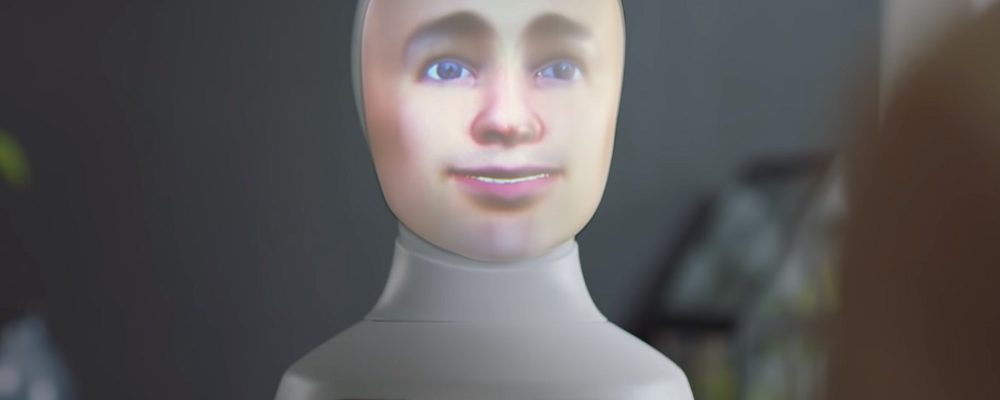In March last year, we looked at NatWest’s effort to boost its customer service firepower by introducing Cora: the UK banking sector’s first-ever robot teller.
Fast forward to February this year, and we explored the ethics around using interviews as props for personalised ambushes, asking whether aggressive questioning designed to make job candidates uncomfortable is truly constructive.
Improbably – but rather poetically – those topics have now blended into each other, with the BBC reporting that Swedish recruiters are road-testing Tengai: the world’s first robot interviewer. [1]
Standing 16 inches tall and resembling a cross between a bust sculpture and an Amazon Echo unit, Tengai has emerged from artificial intelligence firm Furhat Robotics – a company spun out of research based at Stockholm’s KTH Royal Institute of Technology. With the technical development at a mature stage, Furhat has handed Tengai over to TNG, one of Sweden’s largest recruitment firms, to see how she operates in a real-world setting.
TNG chief innovation officer Elin Öberg Mårtenzon tells the BBC: “It typically takes about seven seconds for someone to make a first impression and about five to 15 minutes for a recruiter to make a decision. We want to challenge that.”
The variable that Mårtenzon is eager for Tengai to remove is unconscious bias. “For example,” she explains, “if I ask you a question at the beginning of the process like: ‘Do you play golf?’ and you say: ‘Yes I do, I love playing golf’, and I do too, then in some way I will put that in a positive box.”
As such, Tengai doesn’t deal in conversational banter – she simply draws her questions to each candidate from the same template. Interview sessions are then transcribed, and recruiters go through the texts to determine the best candidate. In that way, the recruiter is kept at one remove from the interviewing process.
In a blog post, TNG CEO Åsa Edman Källströmer writes: “The collaboration with Furhat Robotics will take unbiased recruitment to the next level. We have worked with unbiased recruitment for years, and have explored various artificial intelligence platforms and robotic solutions.
“With [Tengai], we can create an unbiased competence-based selection process and a new and completely unique candidate experience that will engage and enthuse jobseekers. The combination will help us get even better at finding the best candidates for our customers, increase the diversity in their workplace and help us in our journey and vision to create a more sustainable labour market.”
Is the utopian vision that Källströmer evokes realistic? Should humans simply recuse themselves from interviewing for the good of recruitment as a whole?
The Institute of Leadership & Management head of research, policy and standards Kate Cooper says: “We know that there are problems with interviews as a selection technique, and that’s why they’re so frequently supported by things like in-tray exercises and psychometric tests. But what you can’t remove from the interview process is unconscious bias. So in my view, anything designed to tackle that issue is to be welcomed.
“However, my concern with this type of automation is the extent to which the functionality we are inputting into AI is based upon past decisions taken by human beings. If you are building upon a foundation of data that contains the fruits of unconscious bias, then that will inevitably lead the resulting AI tool to make skewed decisions, too.”
Cooper notes: “Another concern I have is that if you remove the human element from the interviewing process, that addresses only one variable. In our research project Beyond the Honeymoon, the Institute found that, in the first few weeks of a new recruit’s employment, there are numerous factors that can influence their engagement – or lack thereof – with the organisation. Of course a robot isn’t a substitute for that first important connection with your new manager which is often facilitated by that feeling of being chosen by someone – another human being.
She points out: “In the end, the onus is on leaders and managers to make the best of their relationships with those around them. Typically, the prospect of taking a hands-on role in choosing team members is something that leaders would relish and approach with keen alacrity. So making relationships work in cases where you haven’t been so closely involved at the outset would require a very specific set of capabilities.”
Cooper explains: “Coaching is a great example to cite, here. A seasoned coach would say that building rapport is a fundamental element of life in the workplace. Indeed, coaches will often have interview-like chemistry meetings with prospective clients to assess mutual compatibility. If automated interviews take those initial opportunities for chemistry out of the equation, then it is still incumbent upon you as a leader to apply the correct skills to ensure the relationship works.”
Cooper adds: “We should be positive about any intervention that enables the interviewing process to be more inclusive and less discriminatory. So for any leader, the most helpful response to automated interviews should be a renewed commitment to making every relationship work – regardless of whether you have had a face-to-face involvement with a particular selection decision.”
For further insights on the themes raised in this blog, check out The Institute’s resources on understanding HR
Image of Furhat Robotics’ recruitment droid taken as a screenshot from this YouTube video

